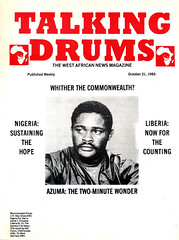The Commonwealth and human rights
by Linus C. Okere
As the Commonwealth Heads of Government meet in Nassau, Bahamas to discuss matters affecting the huge comity of nations, this writer raises the issue of human rights which many member states have flagrantly abused over the years.The pioneering work on the Commonwealth's commitment to observance of human rights is the 1971 Singapore Declaration of Commonwealth principle, the 1979 Lusaka Declaration on Racism and Racial Prejudice and the 1981 Melbourne Declaration. However, these institutions are only referred to when non- Commonwealth members are abusing human rights. They are also supposed to guide members in their domestic and foreign policies.
Human rights violations are an important part of domestic policies in some Commonwealth countries. In view of the killings which began with Amin, given democratic tolerance under Obote and continued today by Okello, one is forced to wonder whether it would not be hypocritical of the Ugandan delegation if it criticised the repressive policies of the Botha regime.
In Zimbabwe, a successful Commonwealth attempt at conflict resolution has been transformed into a continuing state of fear, terror, harassment of the opposition, and military terrorism. The government of Robert Mugabe talks of unity with Nkomo's ZAPU, but at the same time opposition MPs are being harassed and intimidated. It is a negation of Commonwealth values to talk of unity and at the same time pursue a policy of disunity.
At the recent tenth anniversary of the Helsinki Final Act, an important Commonwealth member shared the United States' view when George Schultz presented a litany of Soviet violations of human rights. The human rights provisions should not just be limited to member states' domestic policies. The signatories to the Accords will be giving credence to their opposition to apartheid if they apply them in their relations with South Africa.
Sir Geoffrey Howe's rejections of economic sanctions against South Africa will only serve to turn the Nassau Conference of Commonwealth Heads of Government into an 'apartheid summit'. Although the Foreign Secretary acknowledged that profits are part of the reasons, the other argument that blacks will suffer is weak. Blacks have suffered before, and have been suffering since the institutions of the policy of apartheid. Their experience under an economically boycotted South Africa will make no dif- ference. Verbal opposition to a policy of human degradation should be matched by concrete actions.
For Nigerians, the state of tyranny to which they were subjected by the ousted Buhari regime is unprecedented in their history. While the former External Affairs Commissioner Ibrahim Gambari presented Nigeria's strong opposition to apartheid abroad, at home his masters, General Buhari and Idiagbon, chased ghost enemies, harassed and terrorised Nigerians, passed an anti-press law Decree 4- and banned Nigerian medical association. The Nigerian Security Organisation (NSO) became Nigeria's own Gestapo.
Nigerians heaved a sigh of relief when General Ibrahim Babangida took over from the corrupt dictators. Decree 4 has been abrogated, detainees released and Nigerians promised more humane treat- ment. However, the General has really yet to prove that his coup was not just the put- ting of new wine into an old bottle.
Sir Geoffrey Howe's rejection of economic sanctions against South Africa will only serve to turn the Nassau Conference of Commonwealth Heads of Government into an "apartheid summit".
Nigeria and other African countries can condemn apartheid. They must, however, remember that apartheid policy goes beyond political deprivation, police brutality and denial of basic amenities. The policy includes pass laws, the Group Area Act and restrictions of the movements of blacks. In some Nigerian states, some sinister panels created by the Buhari regime, and designed to extort money from innocent Nigerians are still in existence. President Babangida should order these panels to refund money ex- torted from innocent people. Some Nigerians are still denied their passports. General Babangida should be confident enough to order the return of passports seized by the NSO. The security organisa- tion represented all that was achieved by the Buhari regime - lies, extortion, corruption, hypocrisy and tyranny. Nigerians must be free to move in and out of the country.
n January this unit was formed in the Human Rights Affairs Division of the Commonwealth Secretariat. Since this unit has no investigatory power, it will only rely on information provided by Commonwealth governments, some of whose human rights records are appalling.
The Commonwealth Secretariat should be empowered to investigate member states' behaviour. This will in no way complicate the functions of other international bodies. It will serve as a sincere measure intended to deal with this horrendous assault on the human race. Mr Sonny Ramphal should be able to speak out strongly against human rights violations in member-states. Australia can take action against Pretoria, but there are those who are interested in the welfare of the Australian Aborigines.
Retreats have produced some notable successes such as the 1977 Gleneagles Agreement against sporting contacts with South Africa, and the 1979 Lusaka Accord which produced an independent Zimbabwe. At the Nassau retreat. Commonwealth leaders should explore critically the issue of human rights violations by member-states.
To be able to mount successful campaigns against the bestial regime in South Africa and ensure that their moral opposition is not challenged. Commonwealth leaders must disinfect their own cupboards. Nowhere has it been stated that human rights violations are a part of Commonwealth values.
